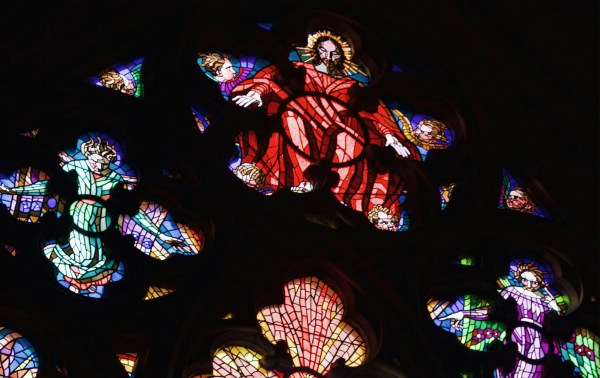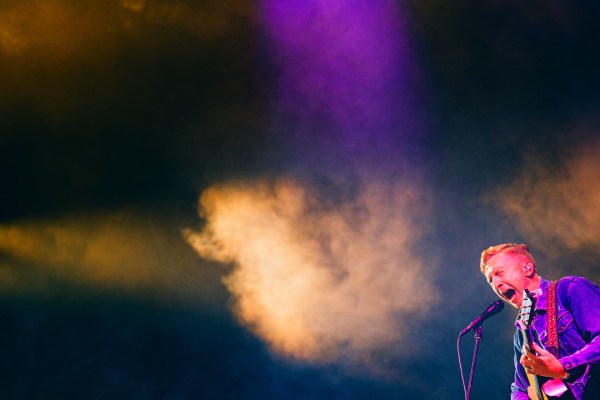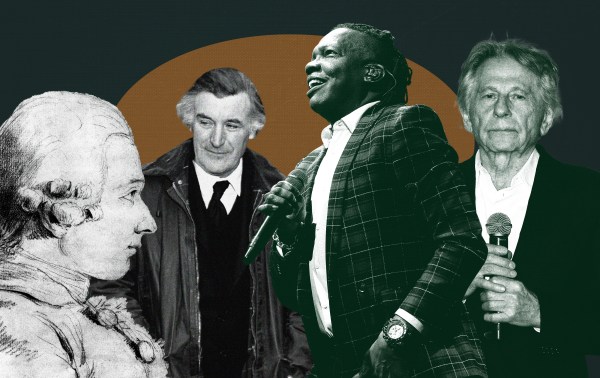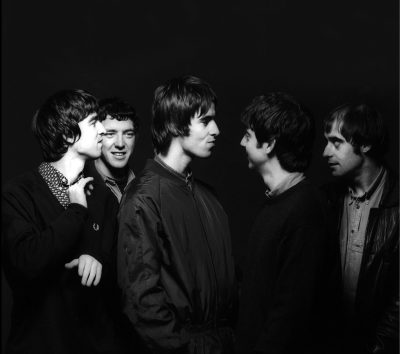My fellow Americans, have you noticed something different in the air this week? A fresh jolt of electricity charging the atmosphere? A certain swagger surge? An energizing influence from a foreign source? That, friends, is Oasis returning to our shores for the first time since the administration of George W. Bush.
The last great headline-grabbing, chart-topping, world-famous rock band announced a year ago that the bickering brothers at its core—Noel (songwriter, lead guitarist) and Liam (lead vocals, snarls) Gallagher—would put aside their bitterness for a world tour, 16 years after they broke up. Often criticized for ripping off the Beatles, they would do the one thing the Beatles never could: get back together. The tour kicked off last month with shows in the United Kingdom and Canada. On Thursday they played at Soldier Field in Chicago; this weekend they’re in New York for two shows at MetLife Stadium, then it’s off to California to play in the Rose Bowl. These are the biggest arenas Oasis has ever played in the States.
The British band’s profile here has always been strange. While they were the most popular band in the world for a few years in the 1990s, they were never the most popular among Americans. They had eight top singles in the U.K. but no No. 1s on the Billboard Hot 100; “Wonderwall” was their best showing at No. 8. (They had much more success on the Alternative Airplay chart, with three songs in the top 10.)
Oasisologists trace this relative failure stateside to their very first tour here, in support of their debut album Definitely Maybe 31 years ago. As producer Mark Coyle observed, “Breaking America very often breaks the band.” Arriving in Los Angeles to perform at the legendary nightclub Whiskey a Go Go, the band imbibed heavily on crystal meth, confusing it for cocaine. The roadies joined in the fun, which is why the band members had different set lists and played different songs. Before long, Liam threw a tambourine at Noel. Noel left the stage, left the city, and nearly left the group. They canceled nine shows before regrouping two weeks later, in Minneapolis. It was the kind of episode that makes for great lore but a bad reputation.
That wasn’t even the band’s most legendary live meltdown. Before their appearance on MTV Unplugged in 1996, Liam claimed he had a sore throat and backed out. The rest of the lads still performed, with Noel on lead vocals and Liam in the audience, medicating his ailing throat by drinking, smoking, and heckling his bandmates. It surprised nobody that when the band broke up in 2009, it was during a tour. They then spent years mocking each other in the press and online. That’s why the Oasis fans I know (including me) were skeptical whether this long-awaited reunion tour would last more than a few gigs.
But, so far, the tour has been a success—and not only because the Fighting Gallaghers strutted onto the stage hand-in-hand for the first show, and then hugged at the end. Rock journalist Steven Hyden declared a Wembley set “Incredible! One of my favorite shows of all time. And hands down the greatest stadium show. The comeback is real, and it’s spectacular.” I believe it. Judging from videos available online and the tracks released on Spotify, the band sounds good. Liam’s voice is more limited than it was in his prime, and he’s long resorted to yelling rather than singing live, but he sounds strong and confident, which were always his most important vocal traits. (Most fans aren’t listening to him, anyway; they’re singing along.) Noel’s harmonies are more prominent and confident than before, perhaps a result of his post-Oasis years as a solo artist. The band is also louder than ever because they have three guitarists for this tour, one more than they’ve used in the past: Noel playing lead, accompanied by original guitarist Paul “Bonehead” Arthurs, and Gem Archer, who came to the band to replace Bonehead in 1999.
The Gallaghers have never been showmen. Even when he was young, Liam didn’t prance around the stage like Mick Jagger. On their first American television appearance, after Liam sat down during Noel’s guitar solo for “Live Forever,” David Letterman joked that he must have been suffering from jet lag. They aren’t there to impress you with anything but their music. From my several experiences seeing Oasis live, I can attest that this strange mix of indifference and arrogance is mesmerizing. And it ages well. This wasn’t the case when I saw the Who—among the most energetic live bands of the classic rock era—in 1997: Lead guitarist Pete Townshend’s hearing was so bad, he couldn’t play electric guitar, and singer Roger Daltrey’s voice was a wreck. But as critic Kyle Smith recently said, the Gallaghers are “fit, slim and none the worse for wear.”
That’s one reason I’ve been able to rationalize this reunion tour as superior to the more desperate reunions that classic rock bands put on a few decades ago. It’s yet more evidence to support my belief that the culture of my peers is superior to its more ballyhooed predecessors. But the sad fact is that Oasis is old. And their tour confirms what I and other members of Generation X have long feared: We are now what boomers were when we were kids.
Around the same time Oasis was coming up, a couple of popular bands from that generation were making much-celebrated returns of their own. Steely Dan got back, Jack, and did it again in 1993 after a 12-year breakup. Sure they were old, but curmudgeonliness was always part of their charm. The Eagles re-gathered in 1994, 14 years after their own breakup. That reunion seemed lame to me, especially that acoustic version of “Hotel California”: Why take an easy listening hit and record an easier listening version? “Live Forever,” released the same year, made much more sense.
My perspective has changed now that I’m older than Steely Dan’s Walter Becker and Donald Fagen (43 and 45, respectively) were when they reunited, as well as Don Henley (46) and Glenn Frey (45) were when the Eagles did. It’s not just my own age that’s a factor here. Oasis hasn’t toured together in 16 years, a longer absence than those boomer counterparts. They’re older, too. Liam is 52—about as old as Townshend and Daltrey when I saw them struggle—and will soon be a grandfather. Noel—whose lyrics include “Hey, stay young and invincible!”—is 58. (The only major reunion tour that similarly astounds may be the Police’s return in 2007, 23 years after their breakup. Their oldest member, guitarist Andy Summers, was 65. Sting was two years younger than Noel is now.)
I’m implicated in all of this melancholy math, of course. I was 21 the first time I saw Oasis, more than 28 years ago. (That doesn’t seem possible, but my calculator insists it’s true.) If I manage to get tickets for this one, I’d be like a geezer at that 1997 Who concert who’d last seen that band in . . . 1969.
When the Oasis tour began, one attendee celebrated it as “our Eras tour.” Insofar as it’s a chance for fans to celebrate their favorite music with tens of thousands of other devotees, certainly. But—and it gives me no joy to say this—unlike Taylor Swift, Oasis is long past its prime. It’s still fun to boast that you’re gonna live forever, but those arthritic joints and your upcoming colonoscopy suggest otherwise.
As happy as I am to see one of my favorite bands at it again—I’d see them if they were playing near me—the Oasis Live ’25 tour is Gen X at its most boomerish, ignoring the years and pretending we’re still the cultural center of the universe.
And that’s okay. It’s our turn.






Please note that we at The Dispatch hold ourselves, our work, and our commenters to a higher standard than other places on the internet. We welcome comments that foster genuine debate or discussion—including comments critical of us or our work—but responses that include ad hominem attacks on fellow Dispatch members or are intended to stoke fear and anger may be moderated.
With your membership, you only have the ability to comment on The Morning Dispatch articles. Consider upgrading to join the conversation everywhere.